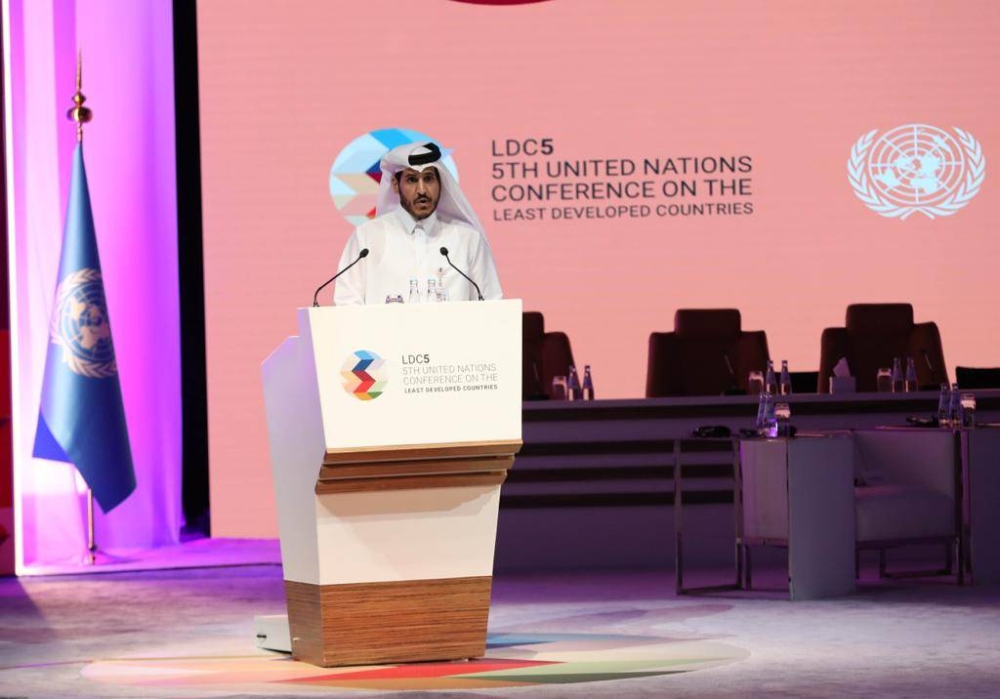HE Minister of Commerce and Industry Sheikh Mohamed bin Hamad bin Qassim Al-Thani called for taking strategic steps to bridge digital divides by providing the necessary financial support to the least developed countries and facilitating the access of the private sector and small companies in these nations to the appropriate digital tools and platforms that link them with global markets.
In a speech delivered at the conclusion of the Private Sector Forum, held within the 5th United Nations Conference on the Least Developed Countries (LDC5) and with the participation of business representatives and heads of international organisations, HE Minister of Commerce and Industry stressed that the Doha Programme of Action for the Least Developed Countries for the Decade 2022-2031 (DPoA) attaches special importance to supporting the private sector, calling for the need to commit to supporting micro, small, and medium-sized enterprises (MSMEs), streamline the supply chains and ease access to markets, in addition to adopting transparent and open regulatory frameworks for business and investment and maintaining intellectual property rights, in line with the legal international frameworks.
HE the Minister pointed out that amidst the current global challenges, especially the conflicts and the climatic change that affect the least developed countries the most, including food security, poverty, widening inequality gaps, global financial system and debts crisis that hinders their development efforts, it is a collective duty to accelerate response and meet the urgent development needs of those countries.
HE the Minister of Commerce and Industry added that out of the State of Qatar's firm commitment to international cooperation and joint action to supporting the path of comprehensive development in the least developed countries, it took the initiative to provide a total of $60 million, including $10 million to help implement the activities of the Doha Programme of Action for the Least Developed Countries, and $50 million to support the outcomes of the programme and enhance the resilience of these involved countries.
This important initiative reflects the firm belief of the State of Qatar's leadership that international humanitarian solidarity is the only way to build a new world, one that is safer, fairer, and stable for current and future generations, HE noted.
HE stressed the importance of the private sector forum, as it is an opportunity to present concrete and practical proposals to develop this sector in the least developed countries, in addition to facing the current challenges and establishing innovative commercial partnerships with these states that are home to more than a billion people.
The high-level participation in this forum reflected the importance attached to enhancing the role of the private sector in the least developed countries, HE said, pointing out that supporting this sector, promoting its growth and building stronger partnerships with it, will have a positive effect on increasing investment, stimulating trade, providing job opportunities, enhancing innovation, and serving as an engine to stimulate economic growth in the least developed nations.
Regarding to the Fifth United Nations Conference on the Least Developed Countries, HE Sheikh Mohamed bin Hamad bin Qassim Al-Thani underlined the great importance of the conference as it is an opportunity to start an effective and constructive dialogue between the leaders and governments of the least developed countries, the representatives of the private sector and civil society, to come up with creative ideas and transform pledges into tangible results, noting that the conference also represents an opportunity that is available once every ten years, to regenerate hope and hasten the pace of sustainable development in the regions that need international help the most.
HE Minister of Commerce and Industry Sheikh Mohamed bin Hamad bin Qassim Al-Thani expressed hope that the outcome and recommendations of the private sector forum will be implemented, in a way that contributes to implementing practical and innovative initiatives that support this sector in the least developed countries and building a better future for their people.
Qatar
Minister of Commerce and Industry calls for bridging digital divides, linking LDCs private sector with global markets

